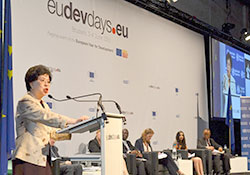Health a priority for European Development Days

WHO/Kristina Belikova
"The Ebola outbreak has been a wake-up call for the international community. WHO is taking steps to make sure that the world will never again be taken by surprise", said WHO Director-General, Dr Margaret Chan in her opening remarks at this year's European Development Days forum on 4 June 2015.
Thanking all partners and organizations that have joined in the fight against Ebola virus disease (EVD), Dr Chan congratulated Guinea, Liberia and Sierra Leone for the tremendous progress they had made in recent months. She insisted, however, that there was no room for complacency and that WHO staff would remain in the three countries until the job--including the assurance of essential health services - was done.
The EVD outbreak has pushed WHO reform into high gear, giving top priority to changes in how WHO operates in the face of an emergency--as agreed at the Sixty-eighth World Health Assembly, which closed on 26 May 2015,including:
- new reform to streamline administrative procedures for a speedier emergency response;
- effective coordination with others, stronger community engagement and better communications; and
- a new mandate to create a WHO global health emergency workforce.
"2015 is a transitional year, as it marks the deadline for reaching the Millennium Development Goals and agreeing on the post-2015 development framework. In this context, my Organization wants to ensure that health remains a top priority in the post-2015 agenda and integrate the lessons learnt from the Ebola crisis", added Dr Chan.
How can the International Health Regulations (2005) help in the fight against pandemics?
Dr Masoud Dara, WHO Regional Office for Europe, chaired a session with a panel of specialists on the International Health Regulations (2005) (IHR). Revisions to the IHR in recent years have broadened their scope to encompass any health risks, as well as specific conditions. By using the IHR, countries monitor outbreaks of diseases with potential cross-border consequences in order to prevent and manage pandemics. The panel discussed the importance of the IHR in the ongoing EVD outbreak and how to ensure that countries do not neglect their obligations under the Regulations.
Refugees and internally displaced people: right to health, right to lLife
Currently, around 55 million people worldwide are displaced. In a session entitled "Refugees and internally displaced people: right to health, right to life, jointly organized by the United Nations Relief and Works Agency and WHO, participants discussed how various organizations respond in conflict areas. The topics included health care for refugees and internally displaced people, and the discussion addressed:
- accessible, culturally acceptable, integrated care for all, including primary health care and mental and maternal health;
- health protection during conflicts;
- involving ministries of health in an intersectoral approach, in line with Health 2020; and
- effective coordination to meet the needs of refugees and internally displaced people.
Mr Kvitashvili, Minister of Health of Ukraine, said that protecting the right to health in times of conflict is a shared responsibility of all stakeholders, including states, international agencies and nongovernmental organizations.
Background
The European Development Days forum was organized in preparation for the forthcoming debate on the Sustainable Development Goals (SDGs) at the United Nations in September 2015. The SDGs are intended to replace the Millennium Development Goals (MDGs), which have mobilized the efforts of the international community over the past 15 years. In July, the third conference on Financing for Development will be organized in Addis Ababa, Ethiopia, which will be an important step on the road to the post-2015 summit at the United Nations.



